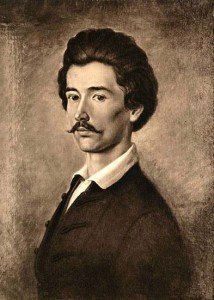Change language:
January 1st – The birthday of Sándor Petőfi, the most famous Hungarian poet

If you ask Hungarian kids about their favorit poet, they’ll probably say Petőfi and even recite a poem. Sándor Petőfi (born January 1st, 1823, Kiskőrös, Hungary – died probably July 31st, 1849, Segesvár, Transylvania) is one of the greatest Hungarian poets and a revolutionary who embodied the Hungarian desire for freedom.
 Out of all Hungarian poets and writers, probably Petőfi’s biography is the most widely known. He was one of the leader figures in the revolution of 1848-49 and became part of national legendry as a martyr. He was The Poet. His life is just as much cultic as his poetry.
Out of all Hungarian poets and writers, probably Petőfi’s biography is the most widely known. He was one of the leader figures in the revolution of 1848-49 and became part of national legendry as a martyr. He was The Poet. His life is just as much cultic as his poetry.
Petőfi had an eventful youth; he studied at several different schools, joined a group of strolling players for some time, and enlisted as a private soldier, but he was soon dismissed from the army due to his poor health. As a schoolboy, he displayed a keen interest in the stage and in literature, and his first poem was published in 1842. In 1844, on the recommendation of Mihály Vörösmarty, the leading Hungarian poet, he became an assistant editor of the literary periodical Pesti Divatlap. His first volume of poetry, Versek, appeared in the same year and made him famous at once, though the tone of his poems scandalized many.
In 1846, he met Júlia Szendrey in Transylvania. They married the next year, despite the opposition of her father, and spent their honeymoon at the castle of Count Sándor Teleki, the only aristocrat among Petőfi’s friends. Their only son Zoltán was born on 15 December 1848. Júlia was the one who inspired his best love poems.
Petőfi became possessed by thoughts of a revolution. Among the various young leaders of the revolution, called Márciusi Ifjak (Youths of March), Petőfi played a major role in starting the revolution in Pest. He joined the Hungarian Revolutionary Army and fought under the Polish Liberal General Józef Bem in the Transylvanian army. The army was initially successful against Habsburg troops, but after Tsar Nicholas I of Russia intervened to support the Habsburgs, they were defeated. Petőfi was last seen alive in the Battle of Segesvár on 31 July 1849.
As britannica.com puts it, Petőfi’s poetry is characterized by realism, humour, and descriptive power and imbued with a peculiar vigour. He introduced a direct, unpretentious style and a clear, unornamented construction adapted from national folk songs. This simplicity was the more arresting as it was used to reveal subtle emotions and political or philosophical ideas. Of his epic poems the János vitéz (1845), an entrancing fairy tale, is the most popular. Petőfi’s popularity was never diminished in Hungary.
You’d probably find streets, roads, squares, museums and statues named after Petőfi in every Hungarian city. He is considered Hungary’s national poet and a key figure of Hungarian cultural life.
Sándor Petőfi – Rise Up, Magyar (Nemzeti Dal)
Rise up, Magyar, the country calls!
It’s ‘now or never’ what fate befalls…
Shall we live as slaves or free men?
That’s the question – choose your `Amen’!
God of Hungarians,
we swear unto Thee,
We swear unto Thee – that slaves we shall
no longer be!
For up till now we lived like slaves,
Damned lie our forefathers in their graves –
They who lived and died in freedom
Cannot rest in dusts of thraldom.
God of Hungarians,
we swear unto Thee,
We swear unto Thee – that slaves we shall
no longer be!
A coward and a lowly bastard
Is he, who dares not raise the standard –
He, whose wretched life is dearer
Than the country’s sacred honor.
God of Hungarians
we swear unto Thee,
We swear unto Thee – that slaves we shall
no longer be!
Sabers outshine chains and fetters,
It’s the sword that one’s arm betters.
Yet we wear grim chains and shackles.
Swords, slash through the damned manacles!
God of Hungarians,
we swear unto Thee,
We swear unto Thee – that slaves we shall
no longer be!
Magyars’ name will tell the story
Worthy of our erstwhile glory:
We must scrub off – fiercely cleansing
Centuries of shame condensing.
God of Hungarians
we swear unto Thee,
We swear unto Thee that slaves we shall
no longer be!
Where our grave-mounds bulge in grey earth
Grandsons kneel and say their prayers,
While in blessing words they mention
All our sainted names’ ascension.
God of Hungarians,
we swear unto Thee,
We swear unto Thee – that slaves we shall
no longer be!
Photo:www.facebook.com/julia.szendrey
Copy editor: bm
Source: Daily News Hungary







